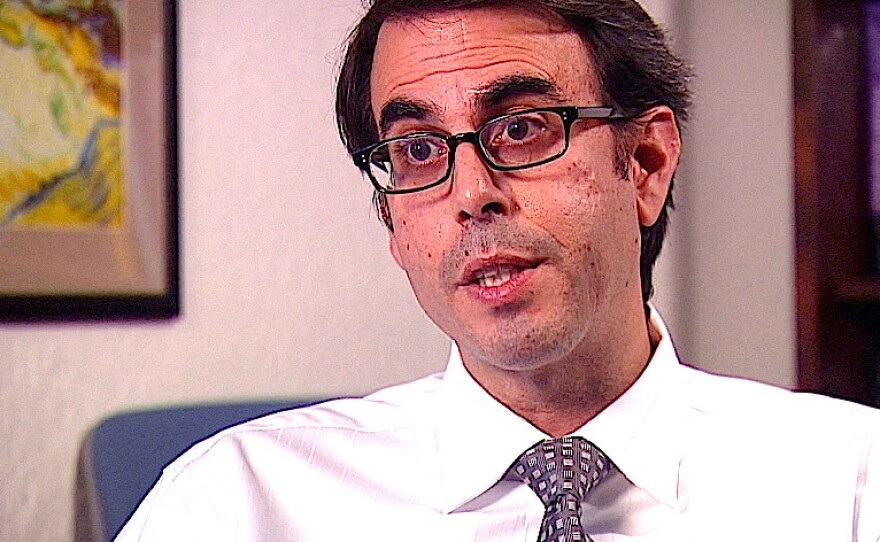With the graying of America’s population, Alzheimer’s disease is becoming a major health threat. More than 60,000 San Diegans have the condition, according to a report by San Diego County.
San Diego County is launching a unique effort designed to stimulate more research into potential treatments. But any possible dividends are likely a long way off.
45 Years and Counting
Richard and Vivian Dickerson have been happily married for 45 years. They have three children, and seven grandchildren.
Richard spent 23 years in the Navy as a medical corpsman and later ran his own photography business.
But about 10 years ago, when Richard was in his mid-50s, Vivian said she felt something wasn’t quite right with her husband.
“I noticed some issues with remembering how to turn, how to get to certain familiar places,” she said.
Vivian said that sense of disorientation continued. Then in time, Frank could no longer handle the family’s finances. He also forgot appointments and couldn’t recall recent conversations.
The Diagnosis
In 2013, Frank got the diagnosis: Alzheimer’s disease.
Vivian has taken on much more responsibility since then.
“Not only for our day-to-day operations but also, I have to oversee that he’s taking his meds properly, that our finances are in order, that I have to know his whereabouts," she said.
Alzheimer’s disease is progressive, meaning it gets worse over time. Vivian said she can’t go there.
“I can’t go for what if, what if, what if," she said. "I can plan some reasonable safeguards, and I just take it day by day."
The Nation's Most Expensive Condition
The annual costs of caring for Americans with Alzheimer’s and other forms of dementia are estimated to top $150 billion. It's the nation's most expensive condition.
Alzheimer’s occurs when a build-up of plaque and tangles damage and destroy nerve cells in the brain. There is no cure for it.

UC San Diego neurologist Michael Rafii treats hundreds of Alzheimer’s patients in his La Jolla clinic. He said the current line of medications offers some relief from memory loss and confusion.
“They treat the symptoms, but they don’t treat the underlying cause of the disease," Rafii said. "So in some patients, they give benefit, but that benefit may not last for more than a couple of years.”
Rafii said despite the enormous economic burden that Alzheimer’s imposes on the country, there’s not nearly enough money allocated for research.
“Currently the annual budget for Alzheimer’s disease research is about $500 million," he said. "The annual budget for cancer research is about $5 billion.”
New County Initiative
San Diego County officials want to help bridge that gap.
County Supervisor Dianne Jacob is leading a drive to raise millions of dollars for local Alzheimer’s research and drug development.
“It is an epidemic, and a growing epidemic," Jacob said. "Not just here in San Diego County, but throughout the country.”
A number of big players in San Diego’s scientific community have pledged to collaborate, including UCSD, the Salk Institute, and the Scripps Research Institute.

Neuroscientist Jerold Chun heads up the effort at Scripps. He oversees a team that’s doing basic research into Alzheimer’s disease.
Chun said there’s a lot we still don’t know about the condition. For example, he said several genes have been identified that are linked to the inherited form of Alzheimer’s. But that form only accounts for about 5 percent of all cases.
“So that leaves 95 percent that are currently not well understood," Chun said. "And so there’s a lot of interest in trying to identify new mechanisms that might be responsible for that larger population, that’s given the name, ‘sporadic’ Alzheimer’s disease.”
Chun’s team is also trying to find targets for new drugs.
They’re using a custom-made array of lasers to aid in the search. The lasers help scientists get a better view of how different molecules interact.
Chun said Alzheimer’s takes many decades to develop.
“Somewhere along that path there should be a time point, maybe a period of life that you can actually interrupt and do something, and the targets that you go after at those different points may vary," Chun said. "And so these are all things that I think are on the table and we need to understand.”
The Devil
But even if researchers identified a target tomorrow that led to a breakthrough therapy, it could take a decade or more for the new drug to reach the clinic.
That would be too late for Alzheimer’s patients like Richard Dickerson.
But he isn’t sitting around feeling sorry for himself. He hopes to enroll in one of the many clinical trials of Alzheimer’s drugs.
In the meantime, he’s not going to let the disease stop him.
Dickerson thinks of Alzheimer’s as the devil.
“The devil’s a liar," Dickerson said. "The devil says you can’t do this and so on, he’s a liar. That’s not what God said. That’s just how I see it.”
Dickerson doesn’t know how much time he has left. But when you think about it, none of us does.






